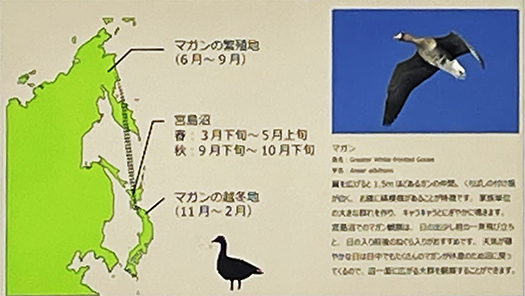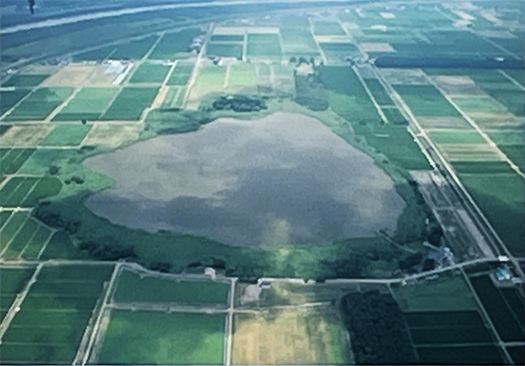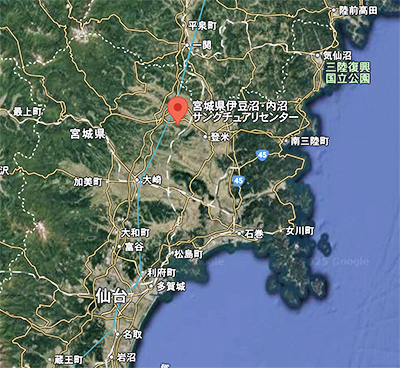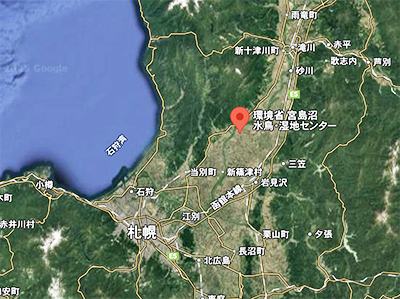

渡り鳥たちと人間社会との間に、なにか響き合う関係性のようなものはあるのだろうか?
きのう、ヤマトタケルの最期、鳥に変身して大空のかなたに飛び去っていくという古事記の一節を書いたけれど、日本という極東の島国での渡り鳥を連想させる文学的表現の嚆矢だったかと。
日本がアジア世界における外交関係を明確に意思しはじめ当時の中華世界の国際的秩序体制に参画していく段階で、国としてのアイデンティティを問われた。古事記はそういった必要性から編纂が始められた経緯。そのことは同時に日本語という言語を、漢字という輸入文化体系をもって書きコトバとしても成立させることにつながった。
そういう背景事情の中で言語創造・確定作業が進められた。ヤマトタケルの一節はそのときに「文学」の嚆矢として生み出された説話なのだろう。神武帝の八咫烏や民話のツルの恩返しなどと同様に、鳥に神格性・文化性を与えることには社会的なある蓋然性・共通認識があったのだと考えられる。この列島に暮らす人びとの共通的な文化常識の基盤に「渡り鳥」などの知識が共有されていたと認められるのではないか。
当時の一般人が広く認識していたこうした事象を伏線に取り入れることで、納得や共感の思いを刺激させたと考えられる。こういう営為によってこの国・社会で文学表現が生まれ出ていった。いやそもそも、音楽や楽器のない時代、自然の中でさまざまな「歌声」を響かせている鳥たちは、音楽性や「訴求力」において圧倒的な共通精神文化の基底になっていったことが想像できると思う。


ちょうど、わたしのことしの移動行動で2月最終週に仙台に移動して、クルマで移動しながら宮城県の「伊豆沼」周辺を通過していたけれど、そのときにはそうとは気付かなかったが、大量のマガンたちの群舞を上空に認識させられていた。かれらは、越冬地として伊豆沼をポイントとしているのだ。その後かれらと、約1ヶ月経って今度は北海道宮島沼周辺で「再会」していた可能性が高い。自然の呼び声。
わたし個人の通常意識では不明だったけれど、その基底にある「なんとなくなつかしい」みたいな心象では「符合」を強く感じさせられていたのだ。
古事記成立の頃の一般人は、現代のわれわれよりもはるかにこういう自然の「リズム」に敏感だったに違いない。そしてそういう認識力に訴求させながら日本語言語文化は揺籃されていったのではないか。そのような思いに深くとらわれ始めております。さていかに。
English version⬇
[The journey of the geese Izunuma, Miyagi Prefecture – Miyajima swamp, Hokkaido, Japan]
Cultural events in the sensitivity domain, such as the musicality and rhythm of nature conveyed by birds. The birds’ journey from Izunuma, Miyagi Prefecture to Miyajima Swamp, Hokkaido, Japan] Cultural events in the sensitivity domain, such as the musicality and rhythm of nature conveyed by birds. …
Is there any kind of resonant relationship between migratory birds and human society?
Yesterday, I wrote about the passage in the Kojiki where Yamatotakeru transforms into a bird at the end of his life and flies away into the sky, which I thought was a pioneering literary expression evoking migratory birds in the Far Eastern island nation of Japan.
Japan’s identity as a nation was questioned as it began to clearly define its foreign relations in the Asian world and participate in the international order system of the Chinese world at the time. The compilation of the Kojiki was initiated out of this need. At the same time, this led to the establishment of the Japanese language as a written language with the imported cultural system of kanji.
It was against this background that the work of creating and establishing the language was carried out. The Yamatotakeru passage was probably a pioneering piece of “literature” produced at that time. As with the yatagarasu of the Jinmu Emperor and the folk tale of the repayment of the crane’s favour, it is thought that there was a certain social probability and common understanding in giving the bird a divine and cultural status. It may be accepted that knowledge of ‘migratory birds’ etc. was shared as the basis of a common cultural common sense among the people living in this archipelago.
By foreshadowing these events, which were widely recognised by the general public at the time, it is thought that they stimulated feelings of acceptance and sympathy. This kind of activity gave birth to literary expression in this country and society. In the first place, in an age when there was no music or musical instruments, it is possible to imagine that birds singing various “songs” in nature became the basis of an overwhelmingly common spiritual culture in terms of musicality and “appeal”.
I had just moved to Sendai in the last week of February as part of my migratory activities and was passing around Izunuma in Miyagi Prefecture by car, when I was made aware of a large number of geese dancing in the sky, although I did not realise it at the time. They use Izunuma as a wintering ground. It is highly likely that they were “reunited” with them about a month later, this time around Miyajima Swamp in Hokkaido. The call of nature.
Although it was unknown to my personal consciousness, I had a strong sense of “coincidence” in my underlying mental image of “somehow nostalgic”.
The general public at the time of the establishment of the Kojiki must have been far more sensitive to these natural “rhythms” than we are today. The Japanese language and culture must have been cradled in appeal to this kind of awareness. I am beginning to be deeply seized by such thoughts. So, what do you think?
Posted on 4月 8th, 2025 by 三木 奎吾
Filed under: 日本社会・文化研究







コメントを投稿
「※誹謗中傷や、悪意のある書き込み、営利目的などのコメントを防ぐために、投稿された全てのコメントは一時的に保留されますのでご了承ください。」
You must be logged in to post a comment.